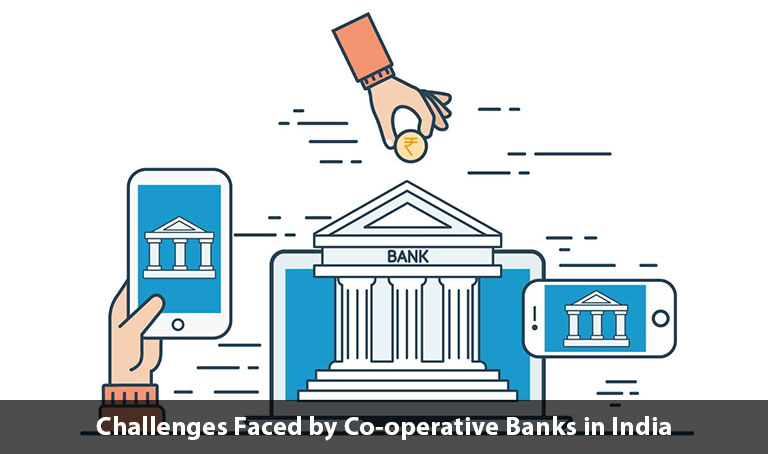Challenges Faced by Co-operative Banks in India
Updated On : Nov 2022
Co-operative banks are small financial entities where the members are the owners and customers of the bank. Primary credit societies, central cooperative banks, state cooperative banks, land development banks, and urban co-operative banks are different types of co-operative banks operating in India. These banks are organized at village or town level, district level, and state level.
The main function of a Co-operative bank is to help people by providing them with loans at a lower rate than other providers in the market.
Co-operative banks, being small in size, face a few challenges in the Indian banking industry.
Dual Control:
Co-operative banks have to follow regulations set by the RBI and their respective state governments, which causes problems in coordination and management.
Missing the Latest Banking Practices:
Co-operative banks lack modern banking practices like net banking, mobile banking, online banking, e-banking, ATM banking, and all other modern banking practices. Due to this, they have been eliminated and remain on the back foot in the modern banking industry.
Lack of Awareness:
People are not well informed about the objectives of the movement, the contributions it can make in rebuilding society, and the rules and regulations of cooperative institutions. They look upon co-operative banks as a means of obtaining services and concessions from the government. People ensure that societies continue to function as long as they expect to receive something from the government.
Limited Coverage:
The size of the cooperative banks is very small. Most of these societies only have a small number of members, and they only operate in one or two villages. As a result, their resources remain limited, which makes it impossible for them to expand their means and extend their area of operations.
Fair Audit:
Audits in the co-operative banks are done entirely by department officials and are neither regular nor comprehensive. Delays in the conduct of audits and the submission of reports are widespread.
Functional Weakness:
The cooperative movement has suffered from an inadequacy of trained personnel right from the start.
Co-operative banks play an integral part in the implementation of development plans and are important for the effective functioning of the banking system in India. India is termed an underbanked country, and after so many scams, it is the need of the hour to take necessary measures to boost the confidence and trust of the public in the banking system. The government should ensure the autonomous and democratic functioning of co-operatives while maintaining the accountability of management to the organization’s members and other stakeholders.
Nelito Systems offers customized solutions & services for its clients from finance and other sectors. To know more about it, write us at marketing@nelito.com or visit us here.


Comments :